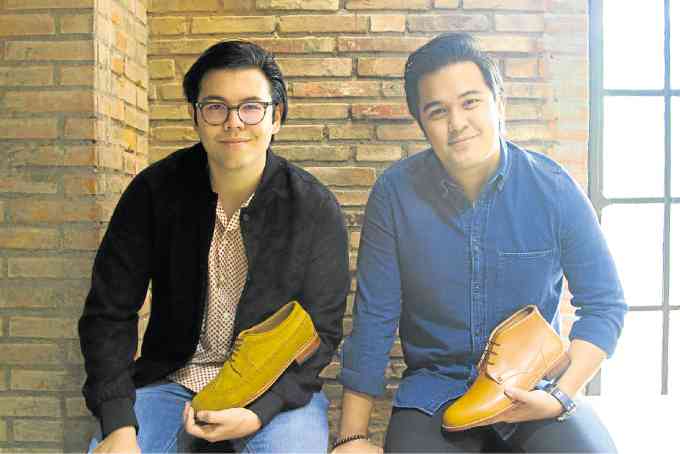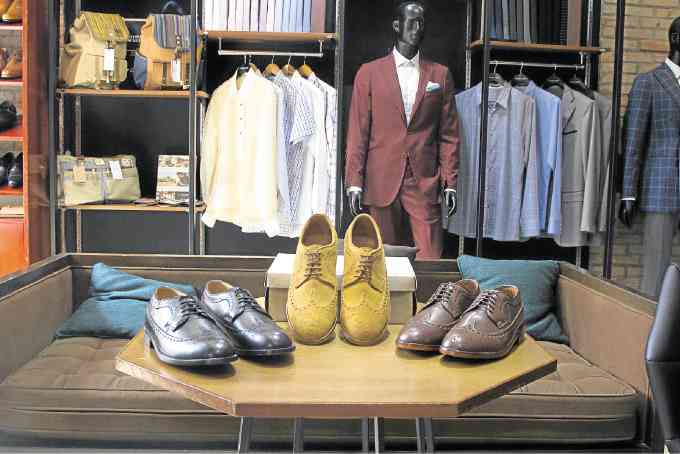
Del Rosario (left) with Marquina’s Desert Suede Quezon Longwing and Litonjua with their Cognac Tan Gomez Chukka Boot —Photos by Anna Gabrielle Cerezo
With zero capital and zero knowledge of the business, three young entrepreneurs reworked an age-old craft and its tradition of excellence to revive the ailing Marikina shoe industry.
Thanks to online smarts, Juancho Del Rosario, Kayne Litonjua, and Patrick Kahn, founders of Marquina Shoemaker, kicked new life into the industry one handcrafted pair at a time.
“We had no capital. Nothing. Zero,” recalled Del Rosario. “So we used e-commerce for our made to order (product). You check out our website, choose a design and pay. And that’s when we begin to make a pair just for you.”
The startup’s lean business model required them to shell out only a few thousands from their savings for prototypes.
Using online payments from initial customers, Marquina Shoemaker started building its business on profits from its first batch of orders.
The group sold 180 units of their first two styles: the penny loafers and moccasins in black noir and mahogany brown.
Having a business background helped. Litonjua is an Applied Corporate management graduate and junior product manager of L’Oreal Paris Skin, while Del Rosario has a Marketing Management degree.
“Being (trained in) marketing means branding comes naturally to us,” said Litonjua. “We knew the consumer side, what people are looking for in a shoe. But we had to teach ourselves manufacturing, supply, and shoemaking itself. (Before we went into the business), all we knew about shoes was that you needed a sole, shoelaces, leather and heels,” he added.
Said Del Rosario: “In terms of what goes into making the shoe, the different steps in the process, we had to find out on our own and through the various suppliers we have now.” Trial and error marked their first year as they went through five different suppliers and eight prototypes to find the perfect fit, he explained.
Supply chain
“We had a hard time building our supply chain. We kept asking ourselves, is this the best setup for us? Is this the best for our brand? We eventually opted for blake stitch construction, where the sole is sown through the shoe. Our shoemaker, the guy who puts the materials together, has 26 years of experience. (Our shoes) travel around Marikina as each pair goes through the hands of specialized suppliers. It’s a shared thing across many experts.” said Del Rosario.
He added: “After a year of finding out and learning, we unveiled the new designs one after the other. One design this month, another the next month, and so on.” Today, five different shoe styles are posted on their website: the penny loafer, moccasin, longwing, monkstrap and chukka boot.
The personalized touch is another edge they have, said the young entrepreneurs. Buyers are free to customize their desired pair, from simple embellishments to the choice of color. At the same time, said Litonjua, they want to portray their shoes as “everyday wear.”
“There’s a stereotype about men in suits, but that’s not what we look like today. We can wear jeans and still wear classic styles that fit the modern lifestyle and are not necessarily limited to (pairings with) suits or barong and board rooms ” he added.
Correct pricing is key, said Litonjua. While most shoe manufacturers go toe-to-toe with cheap imports from China and Vietnam, Marquina Shoemaker decided to create its own identity and standard.
“There’s really no local shoe brand that stands out in the premium segment,” said this management graduate. “In terms of mass market segment, there are many good brands. But top of mind, is there a local premium player that you can think of?”
E-commerce
Said Del Rosario: “The quality of materials we use and the expertise behind our shoes would normally drive up the price, but we wanted to do everything possible to keep a relatively fair price for the quality you’re getting. It got us thinking of e-commerce, which allowed us to give customers the most value for their money.”
With e-commerce, the startup can cut the cost of running business, he explained. The group can make do with a management team of three while banking heavily on networking and social media. Using Del rosario’s home as their office, the team created an effective dynamic by establishing clearly defined roles and contributions.
“I work more on the supply end and product development,” Del Rosario said, adding that Litonjua takes care of branding, marketing and PR. Kahn meanwhile maintains the website, online optimization and other electronic matters. “But we come together when it comes to big business ideas and new designs. We help each other out. It’s a collective practice,” he added.
Banking heavily on social media and networking, Marquina Shoemakers has not spent a single peso on marketing, said Litonjua. “We use the power of social media. We post on our website and let the shoes speak for themselves. The historical expertise associated with the brand name, the style, the comfort and the durability—those are themselves part of marketing and branding. When we note that someone likes our page, we network, we message them and reach out to them.”
Celebrity endorsement
It doesn’t hurt that local celebrities have vouched for the brand, among them actors Albie Casiño, Jake Cuenca and Jason Magbanua.
“A lot of people ask, how much did we pay these celebs? Nothing, zero,” said Del Rosario. “We never paid for (celebrity) endorsement nor given them free shoes. All the pairs they own, they paid for. And luckily enough, they like our shoes and posted about them.”
Two years since they stepped into the business, and with sales of at least 60 unique pairs a month, the newly-minted shoemakers admit they are still learning the ropes of the industry.
“In shoemaking, the learning never stops,” said Del Rosario. “The construction process, the different ways of making a shoe, the materials available, the shoe patterns and how to do them well… It’s not all the same. Until now, we’re still learning,” he explained.
Research is part of the process of learning, said Del Rosario. “Each collection is different. For example, when we went for boots, we had to research what height would work. It’s hot in the Philippines, will boots make the wearer feel too hot? There’s science to it and a lot of research.”
Repeat orders
According to Litonjua, aside from a profitable cash flow, the success of their business has been validated by repeat orders, positive feedback and profit. “There is brand love among customers. We validated that by the fact that we can sell the shoes at a premium price (and our feedback) from them is that it’s quality (buy). We’re starting to make waves. Customers will find you and refer you.”
He added: “We define success when we’ve made an impact in how people perceive local versus imported craft, when buyers now give equal brand equity or value to Marquina Shoes as they would to brands from the US or Europe.”
The next frontier is out there among global brands, said Del Rosario. “In the next few years, if we’re lucky enough to bring this to other countries, we will also be bringing with us the transition we’ve done in Marikina-made shoes. We hope to take with us not just the place and identity itself, but Philippine shoemaking as well.”


